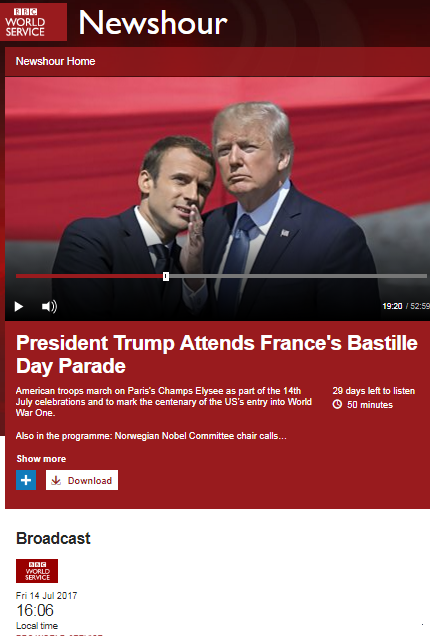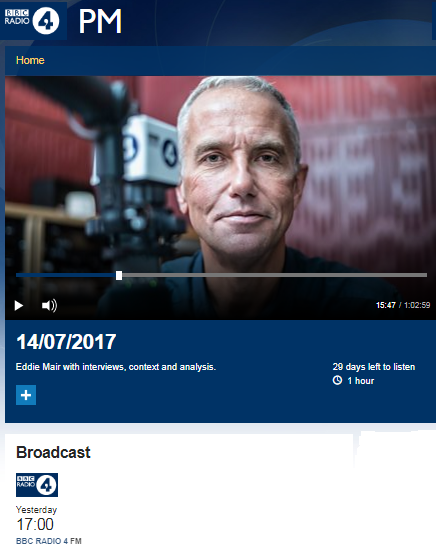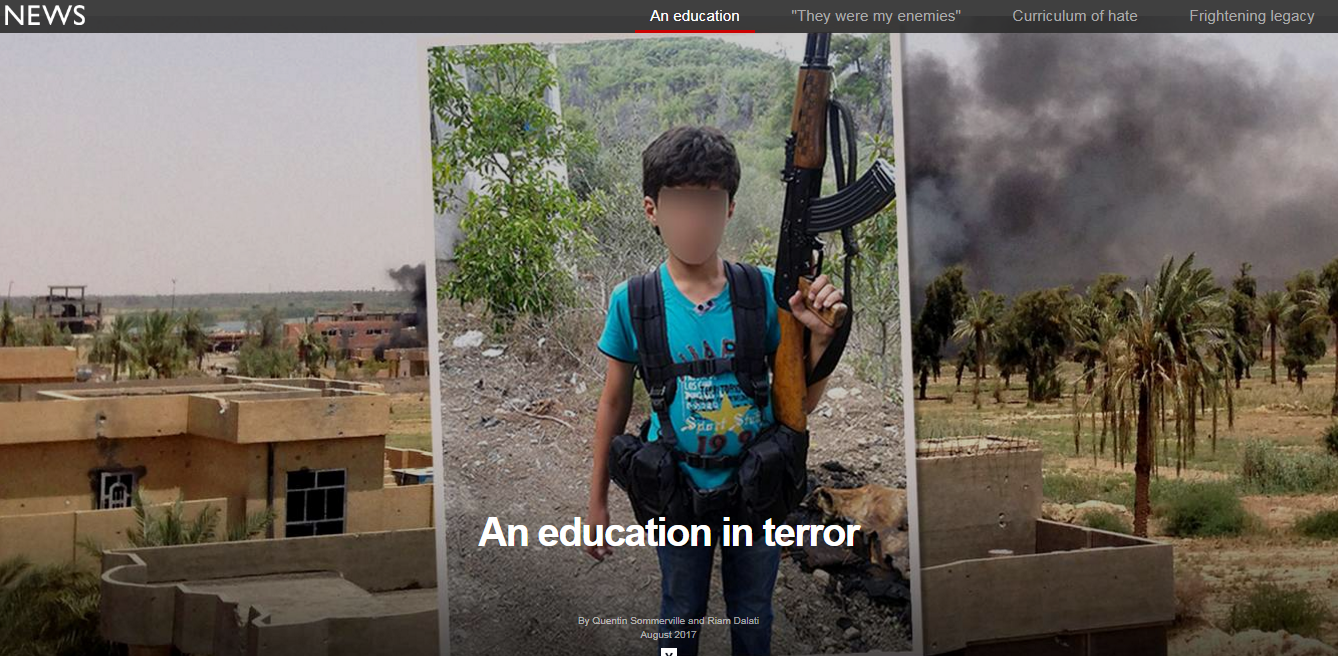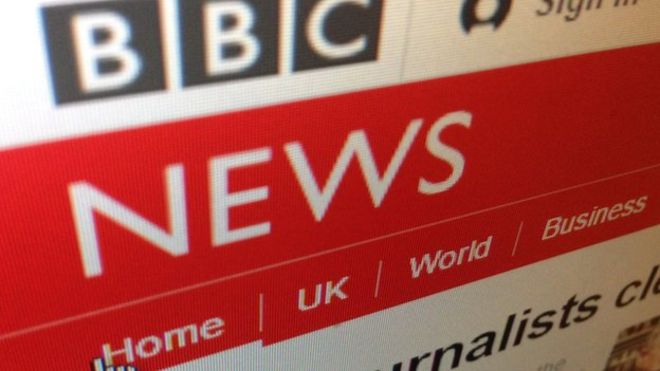Several hours after the terror attack at Lions’ Gate in Jerusalem on the morning of July 14th in which police officers Haiel Sitawe and Kamil Shnaan were murdered and two others wounded, the BBC World Service radio programme ‘Newshour‘ aired a report (from 19:18 here) on that story that was introduced by Julian Marshall as follows:
“And we go now to Israel where two Israeli police officers have died after three Israeli Arab gunmen opened fire on them in Jerusalem’s old city. Police chased the attackers into one of Jerusalem’s holiest sites – known to Jews as Temple Mount and Muslims as Haram al Sharif. All three attackers were killed.”
As was the case in the BBC’s written report on the same incident, that description does not adequately clarify that the terrorists had been on Temple Mount for an unknown period of time before the attack – and had even posted photographs of themselves there on social media – or that, as the Times of Israel reports, they returned to that site – with the police in pursuit – after carrying out the attack.
Marshall continued:
“The mosque complex at al Aqsa has been closed and evacuated and Friday prayers there have been cancelled for only the second time in 50 years. The Palestinian president Mahmoud Abbas has condemned the attack in a telephone call with the Israeli prime minister Benjamin Netanyahu. But Israel’s minister of public security, Gilad Erdan, said the Palestinian leadership should be held responsible.”
Listeners then heard a recording of Erdan speaking which included the only mentions of the words terror and terrorists in the entire report.
“The terrorists they used firearms inside the Temple Mount violating, violating the holiness of this important place. I say and repeat again and again: Israel has kept the status quo on Temple Mount and continue to keep the status quo here. We always respected the freedom of worship to everyone – Muslims, Jews, Christians – but we all should understand that the incitement that was led by President Abbas and the Palestinian Authority directly led to this terror attack that happened this morning.”
Marshall: “Well let’s go live now to Jerusalem and the BBC’s Tom Bateman. So what actually happened in this incident, Tom?”
Although several hours had already passed since the incident took place and the sequence of events was by that time clear, Tom Bateman had apparently not been keeping up with events. [emphasis added]
“Well this happened at 7 o’clock this morning local time. You’ll remember that this is in the vicinity of the most revered site in Jerusalem; holy to both Jews and to Muslims. Now the exact location of this attack has remained still a bit unclear but what we know is that they were close to the Lions’ Gate entrance beside that compound. And the police say they were armed with an automatic weapon, a pistol – there was a knife involved too – and that they opened fire on police officers. Now there was then a chase of some sort and some mobile phone footage has shown that at least one of the attackers was chased by police officers and shot.”
In fact the terrorists had two automatic weapons and Bateman similarly failed to clarify that the terrorists were on Temple Mount before they launched the attack or that they intentionally returned there afterwards. He continued:
“Now as a result of the initial fire by the attackers two police officers were fatally wounded. Ah…they were Israeli police officers. They were Druze – an Arab minority religion in Israel – and the attackers themselves were Israeli Arabs. They were from a town in the north of Israel and had Israeli ID and the domestic security services said that they were not aware of these men beforehand.”
Given the failure by both Marshall and Bateman to provide listeners with the full sequence of events, listeners would be unable to understand the context to their next topic of discussion.
Marshall: “And I would imagine tensions heightened by that decision to close the mosque complex at al Aqsa.”
Bateman: “Yeah, that’s right. As you said that is a highly, highly unusual move. There have been closures in the past for short periods of time when there have been incidents but for the police to say they’re closing it and that prayers not take place is significant. And in response, as you’ve heard, there has been much criticism from Palestinians. There have been prayers taking place outside the compound itself this afternoon. Obviously there a scene of heightened tension.”
Bateman did not clarify to listeners that those “prayers […] outside the compound” were not coincidental.
“The Mufti of Jerusalem, Mohammed Hussein, told Maan News that he was prevented from going to site. “”We are determined to reach the Al-Aqsa Mosque and to hold all prayers in it,” he said. He called on Palestinians to come to Jerusalem or to head to the checkpoints near Jerusalem to protest the cancellation of prayers.
Hundreds of Muslims gathered outside the walls of the Old City, behind hastily set up police cordons, to pray and protest the actions of the Israeli police.
Israeli Arabs and Palestinians spread the message using social media. Using the hashtag #Go_and_pray_at_alAqsa, they called for the faithful to come to the mosque.
The Director of the Mosque, Sheikh Ahmed Omar al-Kiswani, in a video shared on social media, said Israel was “taking advantage of what happened” at the Temple Mount “to impose a new reality on the ground.”
As we saw in part one of this post, the BBC News website was able to report that the closure of Temple Mount after the terror attack was necessary to allow the police to carry out their investigation – just as British police closed areas of London on two occasions following terror attacks there earlier this year – and not just some arbitrary move by the Israeli authorities. The fact that Tom Bateman failed to clarify that point in this report is therefore all the more remarkable and that failure was repeated later on the same day when Bateman gave another report to the BBC Radio 4 programme ‘PM‘.
Following a news bulletin in which listeners were told that “two Israeli police officers have been killed in Jerusalem’s Old City by Israeli Arab gunmen who were then shot dead”, presenter Eddie Mair introduced Bateman (from 14:32 here) “live from Jerusalem”.
Bateman: “Eddie, the ancient walls of Jerusalem encircle this city’s most revered site. From where the golden Dome of the Rock rises over the Old City’s narrow streets is the third holiest mosque in Islam; al Aqsa. For Jews the site is the abode of God’s presence where the first and second Temples once stood. The Old City, heavily guarded, is also one of the most acute flash points in this decades-old conflict and it was not long after dawn that police say three men armed with an automatic rifle, a pistol and a knife attacked Israeli police officers at one of the gates to the site.
Mobile phone footage showed a rapid exchange of fire as one of the assailants was chased within the compound before falling to the ground. The attack killed two Israeli police officers. They were Druze – a minority Arab religion in Israel –whilst officials said the attackers were Arab Israeli citizens from a town in the north of the country and were not known to the security services. Israel’s public security minister Gilad Erdan spoke from the scene.”
Listeners then heard an edited version of the statements from Erdan aired in Bateman’s earlier report – and with it the sole mention of the word terrorists in this item too.
“The terrorists they used firearms inside the Temple Mount violating, violating the holiness of this important place. I say and repeat again and again: Israel has kept the status quo on Temple Mount. We always respected the freedom of worship to everyone – Muslims, Jews, Christians.”
As we see, Radio 4 listeners were also not provided with a full picture of the sequence of events including the fact that the terrorists were on Temple Mount – apparently with their weapons – before they launched their attack and that they returned there afterwards. Like World Service audiences, listeners to Radio 4 would therefore be unable to appreciate the context to the next part of Bateman’s report.
Bateman: “After the shooting police began a search of the site and sealed it off. Friday prayers at the Al Aqsa Mosque are usually attended by thousands of Muslims but the closure prevented that: a highly unusual decision by the Israeli authorities. The Grand Mufti of Jerusalem, the preacher at the mosque, was defiant saying no force on earth could prevent prayers there. Instead though, they took place outside the compound amid signs of growing tension and angry scuffles at another of the Old City’s gates. Adnan Husseini – the Palestinian governor of Jerusalem – criticised the closure.”
Listeners were not told of Husseini’s record of inflammatory statements before they heard his comments.
Husseini: “This is the first time that they announce the prayer will not take place; the Friday prayer. And this has never happened before and I think this is very dangerous. They have to use their mind, you know, when they declare such things. This moment is very sensitive moment. We have to go to pray.”
Erasing all pre-1967 Jerusalem history in typical BBC fashion, Bateman continued:
Bateman: “The Old City is within East Jerusalem which was annexed by Israel after the 1967 war – a move not recognized by the international community. Israel’s government said today’s incident crossed red lines. Meanwhile, the Palestinian Authority president Mahmoud Abbas – under pressure in the past from Israel’s prime minister Benjamin Netanyahu to condemn such attacks – did just that during a phone call between the pair but also said that closing down the area could have repercussions. Since the autumn of 2015 there have been a wave of attacks involving knives, guns and car rammings which had decreased in frequency but had not stopped. Today’s shootings in Jerusalem have already led to concerns about a fresh escalation in tensions.”
It is of course highly doubtful that the BBC would find it appropriate to provide a platform to people in a European country who used veiled threats to demand access to the scene of a terror attack just hours after it had taken place and while the police were still carrying out investigations. However, as we see in these two reports, for Tom Bateman the focus of this story is exactly those people rather than the incident itself, which he fails to explain in a manner which would enable audiences to understand why such the highly unusual action of closing Temple Mount had to be taken.
Related Articles:
BBC’s Knell uses F1 to amplify PA propaganda on Jerusalem
BBC coverage of the Jerusalem terror attack – part one: BBC News website




